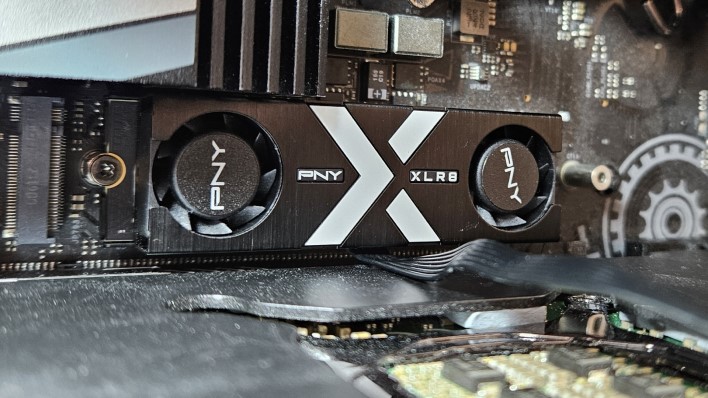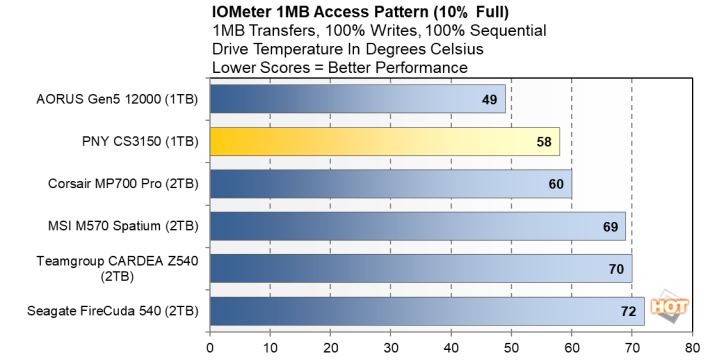PNY CS3150 SSD Review: Actively Cooled, Gen5 Storage With RGB
PNY CS3150 1TB SSD Review: More Benchmarks, Trace-Based Tests And Our Conclusion

HD Tune Pro tests read and write access time as well as read and write performance, providing a good overall look at performance. It doesn't utilize the full horsepower of modern SSDs, but there are clear performance differences between individual drives.
HD Tune Pro v5.75 Benchmarks
While it's not surprising that the CS3150 fell behind in write performance, its read performance is somewhat lower than the AORUS Gen5 12000 1TB here, when it should be about the same. This may come down to a difference in firmware version, but we can't say for certain. Still, the CS3150 performed well overall and offered competitive access times.
CrystalDiskMark x64 Benchmarks
CrystalDiskMark can test both read and write performance with a variety of customizable parameters: sequential versus random, block size, thread count, and queue depth. It's a synthetic benchmark rather than a real world one, but it can showcase an SSD's maximum performance level with a mix of workloads. We tested the drive with CrystalDiskMark with its default options.In the sequential test with a queue depth of 8, the CS3150 performs about as we'd expect: middle-level read performance, with somewhat lower write performance. When queue depth is lowered to just one, the write performance of all drives mostly converges. However, read performance on the CS3150 lags behind other drives, including the AORUS Gen5 12000 1TB. Like with HD Tune Pro, this may be down to a difference in firmware, as the performance gap is a little too large to be explained by normal run-to-run variance.
In random workloads, all of the SSDs we tested performed similarly. They all use very similar hardware, so save for some minor advantages for the higher capacity drives, random performance is more or less on-par.
Final Fantasy XIV: Endwalker Game Level Load Times
While the Final Fantasy XIV: Endwalker benchmark is designed to test graphics performance, it also measures level load times and gives an average time.All the SSDs here are pretty fast, with the CS3150 landing in the middle. The AORUS Gen5 12000 however was the sole drive to break the six-second barrier.
UL's 3DMark Gaming Storage Benchmark
3DMark has its own storage benchmark, which tests a variety of real world workloads in a controlled environment. It tests loading times in three AAA games, recording gameplay through OBS, game installation, and game saving. It is perhaps the most comprehensive gaming-focused SSD benchmark out there.Though the CS3150 hasn't led in any previous benchmarks, here we can see it has leading performance in game load times. The CS3150 is equipped with a newer firmware version than the other SSDs we tested, and its active cooling solution prevents any sort of thermal throttling, which may be the source of the drive's superior performance in this gaming-oriented test.
The CS3150 also has better latency for game loading according to 3DMark, which put it at the top of the charts.
Superior level loads and latency earned the CS3150 first place here, despite the MP700 Pro and CARDEA Z540 offering significantly better sequential performance.
UL's PCMark 10 System Drive Storage Test
PCMark 10's storage benchmark tests general performance, accounting for both latency and throughput. We've tested using the quick system drive test...Just like in 3DMark, the CS3150 outperforms the competition in this trace-based benchmark. Again, we speculate this is likely due to its newer firmware, which may be optimized better for certain workloads, and its cooler.
PNY CS3150 1TB SSD: Thermal And Acoustic Performance
To test how hot and loud the CS3150 gets under full load, we recorded temperature data during our IOMeter testing with only 10% of the drive filled up. This ensures it and the other SSDs are running at maximum performance and power, representing a worst-case scenario.
The CS3150 was the second-coolest SSD here, losing only to the AORUS Gen5 12000, which has a much larger heatsink. PNY's SSD ran much cooler than the M570 Spatium, CARDEA Z540, and FireCuda 540, all of which used smaller passive heatsinks (the motherboard's included SSD heat spreader for the bottom two).
For noise testing, we used a decibel meter positioned right on-top of the drive. By default, the CS3150 has a fan curve of 0% up until 30°C, where it spins up to a noise level of 47DBA, then 50DBA at about 50°C, and then 54DBA at roughly 55°C. This is pretty loud, but the fan curve can be modified via PNY's VelocityX software. To be clear, VelocityX is not to be confused with Velocity-X, which is an older version of the app that for some reason PNY still has on its website, and this older version is also what pops up first on Google.
VelocityX is put together pretty well. It's got a nice, modern UI with good looks and an easy to understand layout. You can set up a completely custom fan curve in the performance tab, and we would definitely recommend doing that since the cooler is much more aggressive than it really needs to be by default.
The RGB options are fairly extensice and offer more or less full control of the lighting. There's lots of different lighting modes and the app offers a preview of what the SSD will look like with the settings you've chosen.
PNY CS3150 1TB SSD: The Verdict
At about $200 for the 1TB version of the CS3150 XLR8 and $300 for the 2TB model, PNY is charging a premium for these drives. Most competitive 1TB PCIe Gen 5 SSDs go for around $170 to $180 at the moment, while the 1TB CARDEA Z540 from Teamgroup is only $149 right now. The 2TB model is better positioned at about $300, which is in the same ballpark as other 12GB/s-capable drives with heatsinks and the same capacity. We haven't tested the 2TB model, but it should perform much like the MP700 Pro and the Z540.In most of the synthetic benchmarks, the PNY CS3150 performed well, but typically trailed in write performance -- which is expected with the 1TB model we tested. However, in the trace-based 3DMark and PCMark tests, the PNY CS3150 led the pack and performed particulatly well. We beleive the strong performance in these tests may be the result of newer firmware on the PNY drive, in conjuction with its active cooler, which prevents any sort of thermal throttling under long, sustained loads. Of course, there's nothing stopping other storage manufacturers from updating their drives, but with the Phison E26 platform being so mature, most companies haven't updated thier drives as Phison has continued to tweak and tune.
Another way the PNY CS3150 stands out from the pack is its cooler. Whether you get the XLR8 model with the USB connector or the HS(W) model with the four-pin connector, the PNY CS3150 is equipped with a compact, high-performance active cooler that dynamically adjusts fan speeds based on the drive's temperature. Though it can get a bit loud with the default fan curve, performance is great, and users can adjust the curve via software if they show choose. Additionally, the XLR8 variant is the first PCIe 5.0 SSD to offer an addressable RGB solution, and it looks pretty good too in our opinion. If the active cooler and RGB lighting on the PNY CS3150 appeals to you, the premium price may be easy to justify.



























